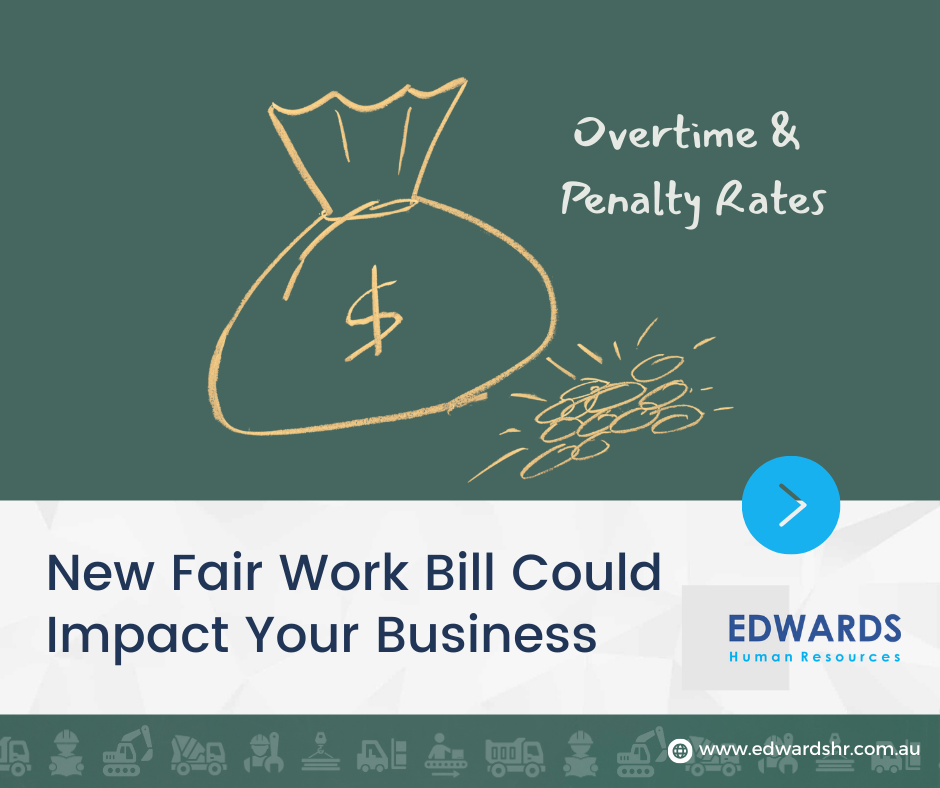- Published
On 24 July 2025, the Labor Government introduced the Fair Work Amendment (Protecting Penalty and Overtime Rates) Bill 2025. The Bill aims to close loopholes that allow penalty and overtime rates in modern awards to be rolled into a single rate of pay which can leave employees worse off.
This could mean significant changes for businesses with staff covered by modern awards.
If passed, the Bill will require the Fair Work Commission to make sure penalty and overtime rates in modern awards can’t be reduced. It will also prevent award terms that roll these entitlements into a flat rate if employees would take home less as a result. This is expected to protect around 2.6 million award-reliant workers and signals increased scrutiny on how employers structure pay.
Why should you care?
Because this Bill is a clear message that pay structures are under the microscope (and let’s not forget that they have been for a long time) and that employers must be compliant with workplace laws.
The Fair Work Ombudsman has recovered over $1.5 billion in unpaid wages over the last couple of years. With new wage theft laws in place, if you are not already checking your payroll systems and award compliance, now is the time.
What does the Bill do?
The Bill proposes a new section (135A) in the Fair Work Act 2009 requiring the FWC to ensure:
- Penalty and overtime rates in modern awards cannot be reduced.
- Modern awards must not include terms that replace penalty or overtime pay with alternative arrangements if that means an employee is worse off for working overtime, weekends, public holidays, irregular hours or shift work.
In practice, this means ‘rolled-up’ or ‘flat’ pay rates or salaries that combine base pay with penalties into one flat rate will no longer be allowed in modern awards if they reduce an employee’s overall pay.
What Could This Mean for our Flat Rate Employees?
If you pay employees a flat hourly rate or salary that is intended to cover base pay plus penalties and overtime, this Bill could impact you.
While many flat-rate arrangements are lawful if employees are better off overall, the Bill makes it clear that modern awards will no longer allow rolled-up rates that leave even one employee worse off at any point in time.
For employers, that means:
- You will need to regularly reconcile flat rates against what each employee would have earned under the award for their actual hours worked.
- If an employee would earn more under the award, you may need to top up their pay.
- Flat-rate arrangements that cannot guarantee employees are always better off could become non-compliant if the award changes under the new rules.
- Clear and accurate time and wage records will be critical to prove compliance.
What about Individual Flexibility Arrangements (IFAs)?
The Bill does not remove the ability to use IFAs under modern awards. An IFA can still allow a rolled-up or flat rate, but only if the employee is genuinely better off overall for their actual hours worked. This means:
- You must have a clear, written agreement in place for each IFA.
- You need to regularly check the arrangement against the award to make sure the employee is still better off, especially if their work pattern changes.
- If award rates increase or the IFA no longer passes the Better Off Overall Test, you must adjust pay accordingly.
Even with an IFA, accurate time and wage records are essential to prove compliance.
We are expecting the same approach to set off clauses in employment contracts.
What’s next?
The Bill passed the House of Representatives on 31 July 2025 and is now with the Senate Education and Employment Legislation Committee, which will report back by 21 August 2025. It may still be amended before becoming law, but it clearly signals that both the Government and regulators are watching.
At Edwards HR, we are monitoring developments and can help you review pay structures and ensure compliance before any changes take effect.
Get in touch with our team today to discuss how we can help.
Stay up to date with all the upcoming changes via our Linkedin or sign up to our ‘Employer Update’ newsletter.



